2023届高考英语复习备考听力训练建议课件(共74张PPT)
文档属性
| 名称 | 2023届高考英语复习备考听力训练建议课件(共74张PPT) |  | |
| 格式 | pptx | ||
| 文件大小 | 10.2MB | ||
| 资源类型 | 教案 | ||
| 版本资源 | 通用版 | ||
| 科目 | 英语 | ||
| 更新时间 | 2023-03-24 12:40:45 | ||
图片预览


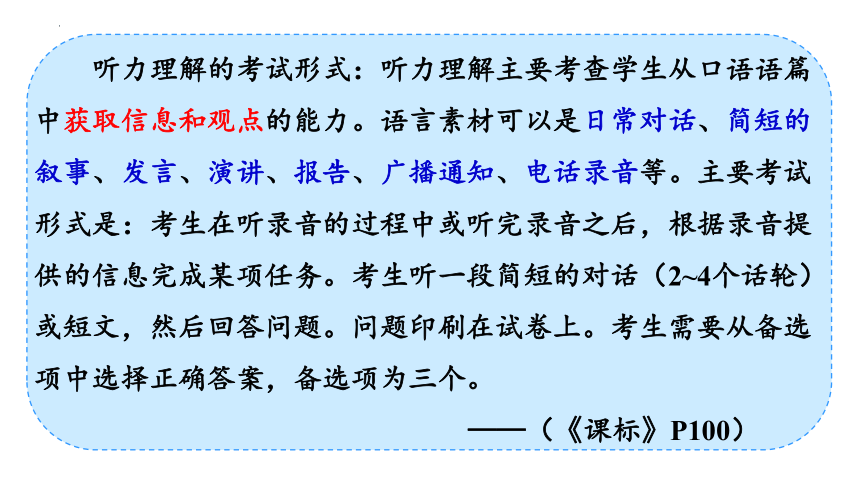
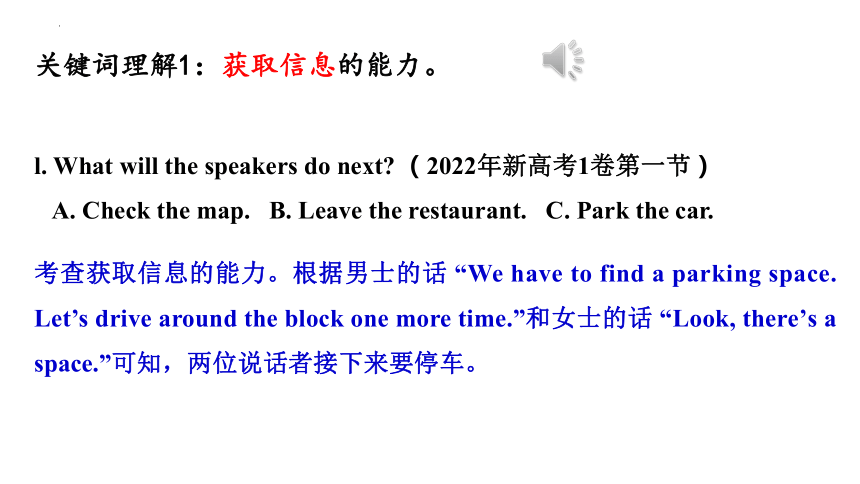
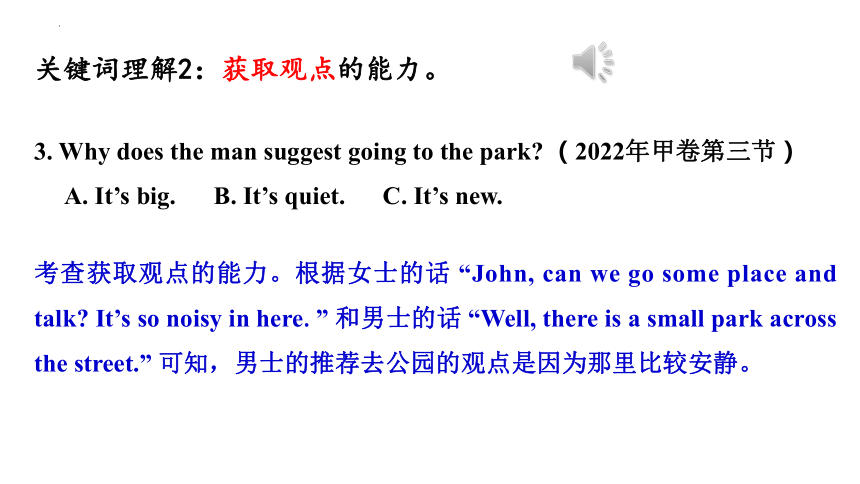
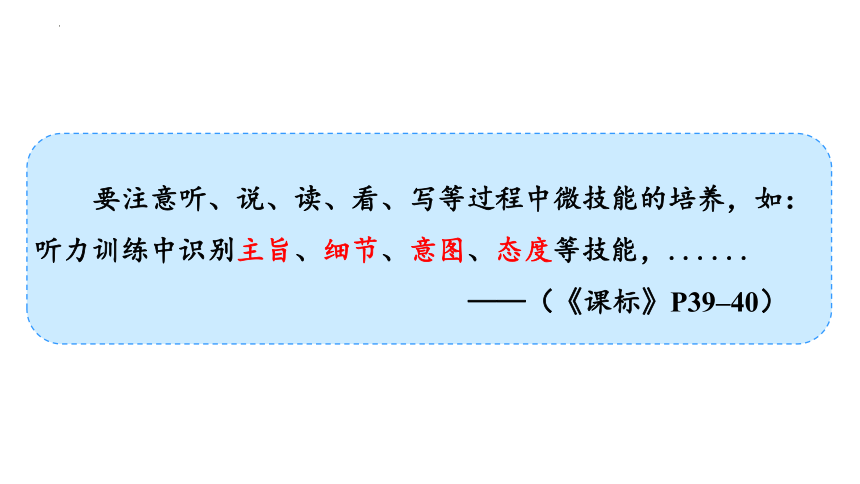
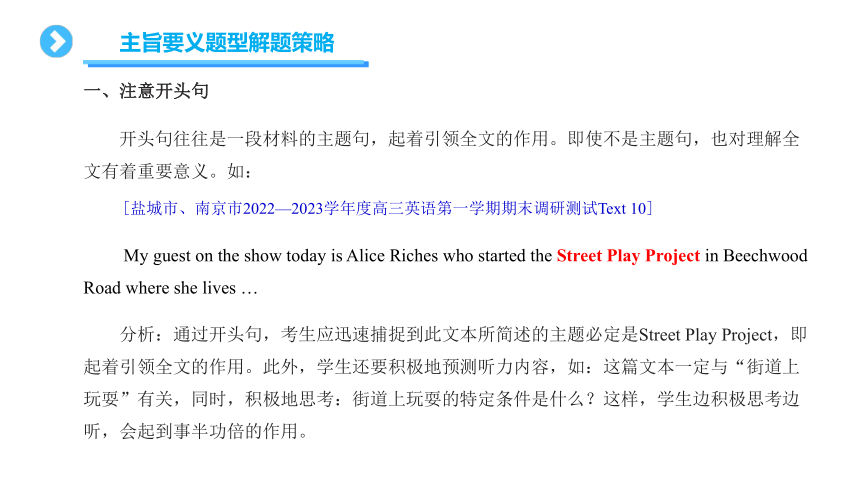
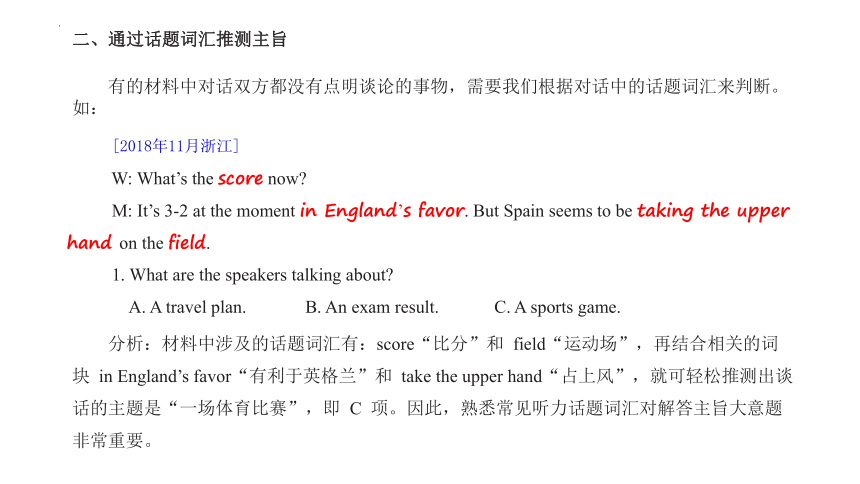
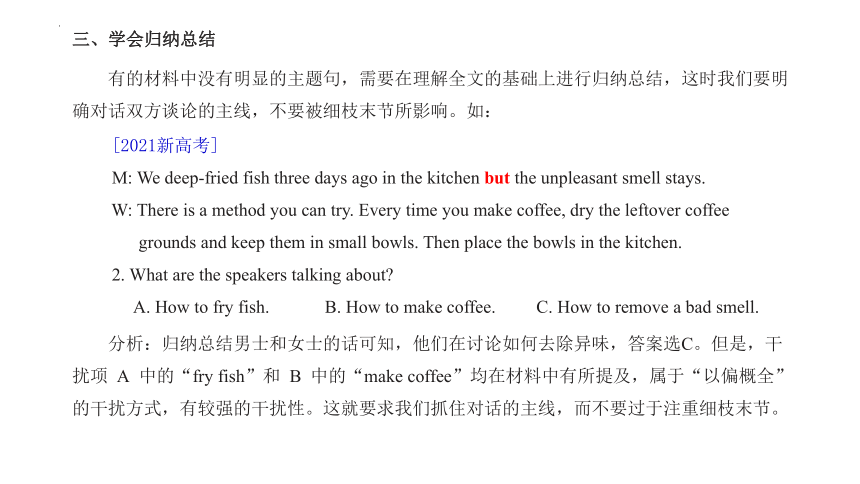
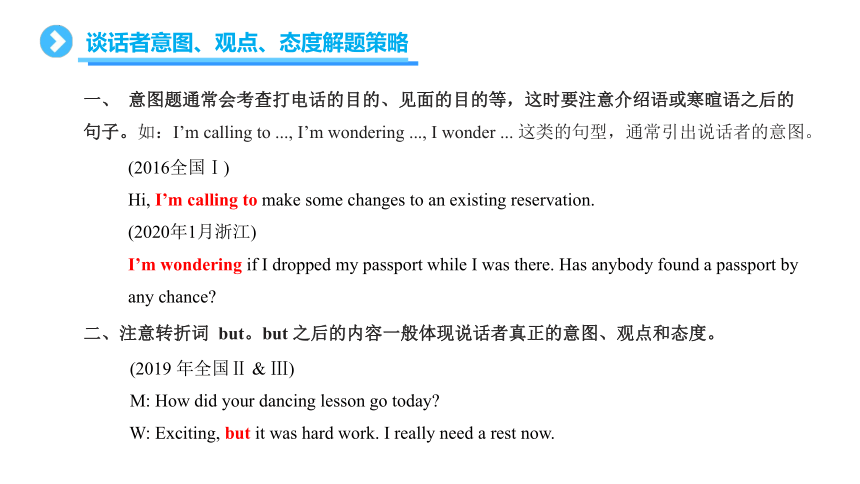
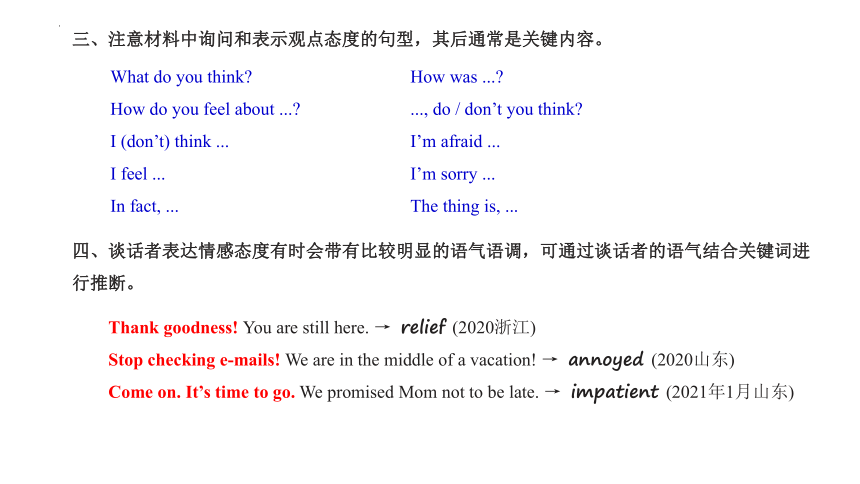

文档简介
(共74张PPT)
听力训练建议
高三英语培训
《课标》如是说
听力理解的考试形式:听力理解主要考查学生从口语语篇中获取信息和观点的能力。语言素材可以是日常对话、简短的叙事、发言、演讲、报告、广播通知、电话录音等。主要考试形式是:考生在听录音的过程中或听完录音之后,根据录音提供的信息完成某项任务。考生听一段简短的对话(2~4个话轮)或短文,然后回答问题。问题印刷在试卷上。考生需要从备选项中选择正确答案,备选项为三个。
——(《课标》P100)
关键词理解1:获取信息的能力。
l. What will the speakers do next (2022年新高考1卷第一节)
A. Check the map. B. Leave the restaurant. C. Park the car.
考查获取信息的能力。根据男士的话 “We have to find a parking space. Let’s drive around the block one more time.”和女士的话 “Look, there’s a space.”可知,两位说话者接下来要停车。
关键词理解2:获取观点的能力。
3. Why does the man suggest going to the park (2022年甲卷第三节)
A. It’s big. B. It’s quiet. C. It’s new.
考查获取观点的能力。根据女士的话 “John, can we go some place and talk It’s so noisy in here.” 和男士的话 “Well, there is a small park across the street.” 可知,男士的推荐去公园的观点是因为那里比较安静。
要注意听、说、读、看、写等过程中微技能的培养,如:听力训练中识别主旨、细节、意图、态度等技能,......
——(《课标》P39–40)
主旨要义题型解题策略
一、注意开头句
开头句往往是一段材料的主题句,起着引领全文的作用。即使不是主题句,也对理解全文有着重要意义。如:
[盐城市、南京市2022—2023学年度高三英语第一学期期末调研测试Text 10]
My guest on the show today is Alice Riches who started the Street Play Project in Beechwood Road where she lives …
分析:通过开头句,考生应迅速捕捉到此文本所简述的主题必定是Street Play Project,即起着引领全文的作用。此外,学生还要积极地预测听力内容,如:这篇文本一定与“街道上玩耍”有关,同时,积极地思考:街道上玩耍的特定条件是什么?这样,学生边积极思考边听,会起到事半功倍的作用。
二、通过话题词汇推测主旨
有的材料中对话双方都没有点明谈论的事物,需要我们根据对话中的话题词汇来判断。如:
[2018年11月浙江]
W: What’s the score now
M: It’s 3-2 at the moment in England’s favor. But Spain seems to be taking the upper hand on the field.
1. What are the speakers talking about
A. A travel plan. B. An exam result. C. A sports game.
分析:材料中涉及的话题词汇有:score“比分”和 field“运动场”,再结合相关的词
块 in England’s favor“有利于英格兰”和 take the upper hand“占上风”,就可轻松推测出谈话的主题是“一场体育比赛”,即 C 项。因此,熟悉常见听力话题词汇对解答主旨大意题非常重要。
三、学会归纳总结
有的材料中没有明显的主题句,需要在理解全文的基础上进行归纳总结,这时我们要明
确对话双方谈论的主线,不要被细枝末节所影响。如:
[2021新高考]
M: We deep-fried fish three days ago in the kitchen but the unpleasant smell stays.
W: There is a method you can try. Every time you make coffee, dry the leftover coffee
grounds and keep them in small bowls. Then place the bowls in the kitchen.
2. What are the speakers talking about
A. How to fry fish. B. How to make coffee. C. How to remove a bad smell.
分析:归纳总结男士和女士的话可知,他们在讨论如何去除异味,答案选C。但是,干扰项 A 中的“fry fish”和 B 中的“make coffee”均在材料中有所提及,属于“以偏概全”的干扰方式,有较强的干扰性。这就要求我们抓住对话的主线,而不要过于注重细枝末节。
谈话者意图、观点、态度解题策略
一、 意图题通常会考查打电话的目的、见面的目的等,这时要注意介绍语或寒暄语之后的句子。如:I’m calling to ..., I’m wondering ..., I wonder ... 这类的句型,通常引出说话者的意图。
(2016全国Ⅰ)
Hi, I’m calling to make some changes to an existing reservation.
(2020年1月浙江)
I’m wondering if I dropped my passport while I was there. Has anybody found a passport by
any chance
二、注意转折词 but。but 之后的内容一般体现说话者真正的意图、观点和态度。
(2019 年全国Ⅱ & Ⅲ)
M: How did your dancing lesson go today
W: Exciting, but it was hard work. I really need a rest now.
三、注意材料中询问和表示观点态度的句型,其后通常是关键内容。
What do you think How was ...
How do you feel about ... ..., do / don’t you think
I (don’t) think ... I’m afraid ...
I feel ... I’m sorry ...
In fact, ... The thing is, ...
四、谈话者表达情感态度有时会带有比较明显的语气语调,可通过谈话者的语气结合关键词进行推断。
Thank goodness! You are still here. → relief (2020浙江)
Stop checking e-mails! We are in the middle of a vacation! → annoyed (2020山东)
Come on. It’s time to go. We promised Mom not to be late. → impatient (2021年1月山东)
听力训练:从攻克语音障碍开始
1. 连读
(Liaison/Linking)
Linking consonant to vowel
sounds like:
“whole don”
“I lie kit”
“depend”
“get a plate”
“pick doubt”
1. hold on
2. I like it
3. deep end
4. get up late
5. picked out
It won't be easy, you'll think it strange
When I try to explain how I feel
That I still need your love after all that I've done
You won't believe me
All you will see is a girl you once knew
Although she's dressed up to the nines
At sixes and sevens with you
Loss of plosion 失爆
4. That man
5. drop down
6. keep trying
1. pop music
2. good book
3. can’t go
It won't be easy, you'll think it strange
When I try to explain how I feel
That I still need your love after all that I've done
You won't believe me
All you will see is a girl you once knew
Although she's dressed up to the nines
At sixes and sevens with you
It won't be easy, you'll think it strange
When I try to explain how I feel
That I still need your love after all that I've done
You won't believe me
All you will see is a girl you once knew
Although she's dressed up to the nines
At sixes and sevens with you
linking vowel to vowel
how I feel /ha a fi l/
Insert a very quick /w/ sound:
● go out
● How are you
Assimilation 同化
/ɡ wa t/
/ha wɑ ju /
linking vowel to vowel
I am /a m/
Insert a very quick /j/ sound:
● I am
● they are
Assimilation 同化
/a j m/
/ e jɑ /
need your love /ni d j l v/
1. /d+j/→/d /:
● did you
● would you
Assimilation 同化
/d d ju /
/wud ju /
2. /s +j/→/ /t /:
● this year
● What’s your name
/' /
/'w t :'ne m/
need your love /ni d j l v/
Assimilation 同化
3. /t+j/→/t /:
● didn’t you
● won’t you
/'d dnt ju/
/'w nt ju/
18. What interests the visitors most
A. The coins. B. The sculpture. C. The paintings.
19. When was the museum opend
A. In the 19th century. B. In the 20th century. C. In the 21th century.
20. Why can’t the collection of clay and glass be changed
A. It has been perfect in itself.
B. It is against the founder’s will.
C. It doesn’t belong to the museum. (2021届南京一模)
18. What interests the visitors most
A. The coins. B. The sculpture. C. The paintings.
I am sure you’ll recognize several of the paintings. This is the gallery that attracts the largest number of visitors.
同义替换
19. When was the museum opened
A. In the 19th century. B. In the 20th century. C. In the 21th century.
Then there are the 19th century paintings and sculptures. The museum was opened in the middle of that century and several of the artists each donated one work.
20. Why can’t the collection of clay and glass be changed
A. It has been perfect in itself.
B. It is against the founder’s will.
C. It doesn’t belong to the museum.
And our clay and glass were left to the museum by its founder. And in the terms of his will, we’re not allowed to add anything to that collection: he believed it was perfect in itself, and we don’t see any reason to disagree.
3. A. The woman wants to go hiking again.
B. The woman took her pet to the hiking.
C. The woman’s kitchen needed cleaning.
D. The woman’s cat was ill.
(2022年1月上海)
3. A. The woman wants to go hiking again.
B. The woman took her pet to the hiking.
C. The woman’s kitchen needed cleaning.
D. The woman’s cat was ill.
(2022年1月上海)
Nasal plosive 鼻腔爆破
3. W: I missed the hiking last week. I had to take my kitten to the clinic.
M: What a pity! Is she all right now
鼻腔爆破:发/tn/时,舌尖抵住上齿龈憋气,将原本发/t/产生的气流逼进鼻腔,和鼻音/n/一并带出。
如:Britain;
certainly;
mountain;
button;
mitten …
Nasal plosive 鼻腔爆破
Reducing pronouns 击穿连读
And our clay and glass were left to the museum by its founder. And in the terms of his will, we’re not allowed to add anything to that collection: he believed it was perfect in itself, and we don’t see any reason to disagree.
his he him her \h\
... especially with his desserts …
Reducing pronouns 击穿连读
sounds like:
“I lover”
“I newer”
“stuffy nose”
“didee”
“hazee”
1. I love her
2. I knew her
3. stuff he knows
4. did he
5. has he
2.重读和弱读
(Stress/Reduction)
Where is the man’s mobile phone
A. On the sofa B. On the desk. C. On the bed.
M: I’ve used it since then. Did I put it on the desk afterwards
W: You often leave it on the sofa when you’re watching TV. Oh, you’re right. Look—you couldn’t see it because of the books.
content words (实词)
function words(虚词)
louder, longer,
higher in pitch
weak, quick, soft
Stress & Reduction
Sometimes, the vowel sound is reduced into a schwa / /.
to becomes /t /
for becomes /f /
1. I’d like to go.
2. I need to talk to you.
3. I’d like to go to the park.
1. Let’s go for a walk.
2. Wait for John.
3. This is for Bill.
W: You often leave it on the sofa when you're watching TV. Oh, you're right. Look--you couldn't see it because of the books.
W: You often leave it on the sofa when you're watching TV. Oh, you're right. Look—you couldn't see it because of the books.
content words (实词)
function words(虚词)
louder, longer,
higher in pitch
weak, quick, soft
affirmative:
I can do it.
negative:
I can’t do it.
You can do it.
You can’t park here.
● 在二语习得理论中,对听力理解的重要性有更为直接的表述:Listening comprehension is a key to reading comprehension and written composition.
(听力理解是阅读理解和写作的关键。)
Read a lot & Read aloud
听力训练:贵在方法与坚持
一、精听&泛听
精听策略
1、与考试相匹配
学生找一个相对来说较为安静的场所,以考试的标准严格要求自己,练习的模式同考试相同,即听材料,同时做题。
可以进行20道题的综合训练,也可以针对自己需要提高的项目进行训练,如试题中的前五题、细节理解题、推理判断题、计算题等等。
精听策略
2、边听边默写
类似于大学英语专业四级的某项考试题型,学生准备好笔和纸,在听音频材料的过程中,一边听一边将听到的内容完完整整记下来,听不清、听不懂或没来得及记下来的内容,可以重复听。虽然这种方法的任务量很大,但学生在听默的过程中必然会有意识地注意前面所讲过的语音知识问题,在长期坚持之后,会更大程度上扫清语音障碍。
泛听策略
磨耳朵
泛听不要求学生做题目,也不需要他们将听到的内容写下来,甚至都不要求他们非要听懂所听内容,只需要耳朵里有英语的声音即可。在允许的情况下,有条件的学生可以随时随地听。这种方法的好处是学生没有压力,但长期坚持,效果也非常明显,根据实验,学生在无数次的磨耳朵之后,会自然地进行跟读,甚至会提前说出语音材料的内容。
二、攻克前五题
前五题
前五题之所以难是因为考试刚开始还未进入状态,情绪波动大。特别是慢热的考生进入状态慢,听力考试却已经开始了。最严重的是如果有一题没听到,后面一直紧张、纠结、难过,导致连续错;同时,前五题对话只读一遍,题目设置灵活;材料较短,提供的答题线索有限,一旦错过就影响答题。
如何练习
一、为了攻克前五题,学生需在平时的训练过程中形成一个良好的心态,把练习当做考试,把考试当做练习。可以对这五题进行集中训练,考前要休息好,播放听力前不要无所事事:(1)听之前的2-3分钟,一定要浏览题目和答案,进行适当预测,试听时要适应主播;调整好心理状况,快速进入状态,避免慌张。实在不会做,根据已知信息排除,再不会就学会放弃,不能耽误做下一题。(2)在思维上和解题技巧上下功夫,切记不要听到什么就选什么,善于抓住关键信息和排除干扰选项;
如何练习
二、学会积累前五题的常考题型和易错题型,针对这两项进行针对性训练,不能眉毛胡子一把抓。要建立一个文档,存好音频和对应的题目,每隔一段时间提取出来进行练习,信息关键点要反复听,个别关键句多听几遍,并在原来的基础上进行总结、提升。还要学会根据录音中说话者语音的变化,理解其表达的意义和观点,揣测其态度、意图、情感等。
三、积累听力场景词汇
如何积累
A
B
C
D
E
F
G
四、把握最新考试动态
最新高考
请大家听一段2023年1月8日山东高考英语听力第一套的一段音频:
Text 3(话题:同事退休;词数:40;时间:19’’;语速:123词/分)
W: It seems as if everybody is talking about Jason’s retirement.
M: Yes, his office is filled with gifts. I gave him a T-shirt with a baseball pattern on it.
W: That’s nice. I’ll get him something this afternoon. Hope it’s not late.
最新高考
录音人: 有变化
口音: 女主播(美音,同2022年);男主播(英音,新主播)
词数:851 语速:129词/分
试题结构:23343
继2019年浙江首考和山东高考同时使用烟嗓音主播之后,2023年浙江首考和山东高考再次联手使用英音男主播。特点:英音+美音;语速比2022年稍快;均为常用话题。按照往年经验,六月高考会再次使用同样的主播,因此山东高考的二套听力试题是新高考考生适应新主播的最佳材料。
以2023年山东第二套听力为例
特点:英音+美音;语速比2022年稍快;均为常用话题。
1.平均语速:136词/分(2022年为122词/分)
2.录音稿总词数:891词
3.语音:女主播(美音,同2022年);男主播(英音,新主播)
4.试题结构:23343
W: Could you check this bill for me I don’t think it’s right.
M: Certainly. First, did you have two coffees
W: Oh, did I
M: Yes. You had one before the meal and another after.
(2023年1月山东第二套Text 2)
部分语音、语言知识提要
提要:You had one before the meal and another after. 句尾省略了the meal,完整句子为You had one before the meal and another after the meal。能否注意到省略的用法会影响考生对语意的理解。
W: How much time do we have before the movie We won’t have to hurry, will
we
M: Don’t worry. It’s 6:30 now. We still have two hours. It takes only 30 minutes
to get there.
(2023年1月山东第二套Text 4)
提要:1. 不完全爆破: We won’(t) have to hurry, will we
2. 弱读: It takes only 30 minutes to get there / /.。
W: Good morning, sir. I’d like to ask you a few questions if I may.
M: Well, I’m waiting for my flight. So I guess I can if you make it brief.
(2023年1月山东第二套Text 5)
提要:So I guess I can if you make it brief.中省略了answer your questions,即完整句子为So I guess I can answer your questions if you make it brief.学生若无法根据上下文补足句子,则可能会影响其对语意的理解。
M: Hello, Claudia. Do you remember me
W: Of course. Hello, Chris. You look well.
M: It must be eight years since you left school.
W: That’s right. You were four years below me. I was in the same year as your older sister, Stephanie
M: Yes, you two were very close.
W: Is Stephanie here for the 50-year celebration of our school
M: No, she is in Denmark for business.
W: What are you doing now
M: Off to school. I got a place at university and I am majoring in business studies.
W: That sounds interesting. I got a job as an interpreter.
M: What languages do you speak
W: Apart from English, I speak French and German.
M: I didn’t get on well with my French teacher here at school, so I dropped the subject at the end of my fifth year.
W: Where do you study
M: In London. I enjoy living in London.
W: I sometimes travel to different parts of Britain with my boss to do interpreting for him. Next week, he has a conference in London.
M: Will you have time to call and visit me while you’re in the area
W: Yes, I’d love to.
M: I’ll give you my phone number. Ring me in the evening.
W: Thank you. We’ll be able to have more time to catch up.
(2023年1月山东第二套Text 9)
提要:[语言知识]
below prep(数量、水平等)在……以下/低于
close adj. 亲密的
place n. [C]入学名额(熟词生义)
interpreter n. [C]口译工作者;口译译员
drop vt. 停止;终止;放弃
major in sth (在大学)主修……
catch up 补做(未做的事),此处指“叙旧”
提要:[语音知识]
1. 完全爆破与不完全爆破:
It must be eigh(t) years since you lef(t) school.
2. 弱读、不完全爆破:
Off to school. I got a place a(t) university and I am majoring in business studies.
本段听力文本话题为偶遇寒暄;词数共208个;时间:1‘29“;语速:140词/分。这也是听力第二部分唯一提供4道题目的材料,篇幅较长(共10个话轮),语言较为复杂(带有阅读理解的味道)。因此,考生在备考过程中要关注此等篇幅和语言特点的文本,要进行有意识的听说训练。
W: Welcome aboard our city tour bus. First, let me tell you about the tour. We’re going to travel through the most historic parts of the city for about an hour, with lots of chances for you to take photos or just enjoy the wonderful buildings like the City Hall and the Royal Theater. Then, we’ll drop you off at the museum. You have about two hours there. At 11:30, we’ll start for our next destination—the Stanley Market. You may buy some fruit and cheese from the marketplace and have a light meal in the park nearby. But please, please, please come back on time at 1:30 p.m. We can’t wait for any latecomers. Now, I’ll give you some instructions on safety.
(2023年1月山东第二套Text 10)
提要:[语言知识]
historic adj. 历史上著名(或重要)的
marketplace n. [C]集市;市场(合成词)
latecomer n. [C]迟到者;来迟者(合成词)
instructions n. [C][常用复数]指示;命令;吩咐
drop sb off 把某人送到……;让某人在……下车
have a light meal 吃顿便餐
提要:[语音知识]
1. 浊化:
Then, we’ll drop you off at the museum. drop中的/p/ 浊化成/b/ 的音:
/dr b/
2. 不完全爆破:
We can’t wait for any latecomers.
latecomers中的te不完全爆破: /le tk m (r)z/
听后:一定要善于总结错误出现的原因、语音知识、词汇、语法、文化背景知识等,经过一定时间的记录积累,学生就会清楚自己听力上的薄弱点,有的放矢地训练。
课堂上尽量为学生创造听英语和说英语的环境;
重视早读课的朗读(read aloud);
刻意模仿练习:通过模仿和实践培养辨音能力和语流连贯能力。
1. 以“说”促“听”, 听说一体。
阅读有助于:
摆脱心译过程;
提高思维节奏;
丰富学生的知识,培养语感和英语思维方式。
听读结合有助于增强语感,辨别语流,能使词句的音、形、义在记忆中迅速统一起来,减少判断误差。
2.以“读”促“听”,听读结合。
精细听力训练有助于:
反复听效率高于盲目刷题;
增加词汇量;
去除听力死角。
3.以“听”促“听”,精细训练。
五、考前30天
普通高中英语课程语言技能内容要求在选择性必修部分提出:课外视听活动每周不少于40分钟。
——(《课标》P37)
1、每天下午3点钟时,进行统一的听力训练,以适应高考时间;
2、进行专项训练、前五题专训、或错题训练。
共勉:其实,高考听力整体来说语速平缓、音调清晰,因此还是非常
students friendly的,就因为如此,考生在平时就更要重视听力的训练,
因为如果忽略了平时的训练,高考还是抓不住大好的拿分机会。
谢 谢 各 位 的 聆 听!
听力训练建议
高三英语培训
《课标》如是说
听力理解的考试形式:听力理解主要考查学生从口语语篇中获取信息和观点的能力。语言素材可以是日常对话、简短的叙事、发言、演讲、报告、广播通知、电话录音等。主要考试形式是:考生在听录音的过程中或听完录音之后,根据录音提供的信息完成某项任务。考生听一段简短的对话(2~4个话轮)或短文,然后回答问题。问题印刷在试卷上。考生需要从备选项中选择正确答案,备选项为三个。
——(《课标》P100)
关键词理解1:获取信息的能力。
l. What will the speakers do next (2022年新高考1卷第一节)
A. Check the map. B. Leave the restaurant. C. Park the car.
考查获取信息的能力。根据男士的话 “We have to find a parking space. Let’s drive around the block one more time.”和女士的话 “Look, there’s a space.”可知,两位说话者接下来要停车。
关键词理解2:获取观点的能力。
3. Why does the man suggest going to the park (2022年甲卷第三节)
A. It’s big. B. It’s quiet. C. It’s new.
考查获取观点的能力。根据女士的话 “John, can we go some place and talk It’s so noisy in here.” 和男士的话 “Well, there is a small park across the street.” 可知,男士的推荐去公园的观点是因为那里比较安静。
要注意听、说、读、看、写等过程中微技能的培养,如:听力训练中识别主旨、细节、意图、态度等技能,......
——(《课标》P39–40)
主旨要义题型解题策略
一、注意开头句
开头句往往是一段材料的主题句,起着引领全文的作用。即使不是主题句,也对理解全文有着重要意义。如:
[盐城市、南京市2022—2023学年度高三英语第一学期期末调研测试Text 10]
My guest on the show today is Alice Riches who started the Street Play Project in Beechwood Road where she lives …
分析:通过开头句,考生应迅速捕捉到此文本所简述的主题必定是Street Play Project,即起着引领全文的作用。此外,学生还要积极地预测听力内容,如:这篇文本一定与“街道上玩耍”有关,同时,积极地思考:街道上玩耍的特定条件是什么?这样,学生边积极思考边听,会起到事半功倍的作用。
二、通过话题词汇推测主旨
有的材料中对话双方都没有点明谈论的事物,需要我们根据对话中的话题词汇来判断。如:
[2018年11月浙江]
W: What’s the score now
M: It’s 3-2 at the moment in England’s favor. But Spain seems to be taking the upper hand on the field.
1. What are the speakers talking about
A. A travel plan. B. An exam result. C. A sports game.
分析:材料中涉及的话题词汇有:score“比分”和 field“运动场”,再结合相关的词
块 in England’s favor“有利于英格兰”和 take the upper hand“占上风”,就可轻松推测出谈话的主题是“一场体育比赛”,即 C 项。因此,熟悉常见听力话题词汇对解答主旨大意题非常重要。
三、学会归纳总结
有的材料中没有明显的主题句,需要在理解全文的基础上进行归纳总结,这时我们要明
确对话双方谈论的主线,不要被细枝末节所影响。如:
[2021新高考]
M: We deep-fried fish three days ago in the kitchen but the unpleasant smell stays.
W: There is a method you can try. Every time you make coffee, dry the leftover coffee
grounds and keep them in small bowls. Then place the bowls in the kitchen.
2. What are the speakers talking about
A. How to fry fish. B. How to make coffee. C. How to remove a bad smell.
分析:归纳总结男士和女士的话可知,他们在讨论如何去除异味,答案选C。但是,干扰项 A 中的“fry fish”和 B 中的“make coffee”均在材料中有所提及,属于“以偏概全”的干扰方式,有较强的干扰性。这就要求我们抓住对话的主线,而不要过于注重细枝末节。
谈话者意图、观点、态度解题策略
一、 意图题通常会考查打电话的目的、见面的目的等,这时要注意介绍语或寒暄语之后的句子。如:I’m calling to ..., I’m wondering ..., I wonder ... 这类的句型,通常引出说话者的意图。
(2016全国Ⅰ)
Hi, I’m calling to make some changes to an existing reservation.
(2020年1月浙江)
I’m wondering if I dropped my passport while I was there. Has anybody found a passport by
any chance
二、注意转折词 but。but 之后的内容一般体现说话者真正的意图、观点和态度。
(2019 年全国Ⅱ & Ⅲ)
M: How did your dancing lesson go today
W: Exciting, but it was hard work. I really need a rest now.
三、注意材料中询问和表示观点态度的句型,其后通常是关键内容。
What do you think How was ...
How do you feel about ... ..., do / don’t you think
I (don’t) think ... I’m afraid ...
I feel ... I’m sorry ...
In fact, ... The thing is, ...
四、谈话者表达情感态度有时会带有比较明显的语气语调,可通过谈话者的语气结合关键词进行推断。
Thank goodness! You are still here. → relief (2020浙江)
Stop checking e-mails! We are in the middle of a vacation! → annoyed (2020山东)
Come on. It’s time to go. We promised Mom not to be late. → impatient (2021年1月山东)
听力训练:从攻克语音障碍开始
1. 连读
(Liaison/Linking)
Linking consonant to vowel
sounds like:
“whole don”
“I lie kit”
“depend”
“get a plate”
“pick doubt”
1. hold on
2. I like it
3. deep end
4. get up late
5. picked out
It won't be easy, you'll think it strange
When I try to explain how I feel
That I still need your love after all that I've done
You won't believe me
All you will see is a girl you once knew
Although she's dressed up to the nines
At sixes and sevens with you
Loss of plosion 失爆
4. That man
5. drop down
6. keep trying
1. pop music
2. good book
3. can’t go
It won't be easy, you'll think it strange
When I try to explain how I feel
That I still need your love after all that I've done
You won't believe me
All you will see is a girl you once knew
Although she's dressed up to the nines
At sixes and sevens with you
It won't be easy, you'll think it strange
When I try to explain how I feel
That I still need your love after all that I've done
You won't believe me
All you will see is a girl you once knew
Although she's dressed up to the nines
At sixes and sevens with you
linking vowel to vowel
how I feel /ha a fi l/
Insert a very quick /w/ sound:
● go out
● How are you
Assimilation 同化
/ɡ wa t/
/ha wɑ ju /
linking vowel to vowel
I am /a m/
Insert a very quick /j/ sound:
● I am
● they are
Assimilation 同化
/a j m/
/ e jɑ /
need your love /ni d j l v/
1. /d+j/→/d /:
● did you
● would you
Assimilation 同化
/d d ju /
/wud ju /
2. /s +j/→/ /t /:
● this year
● What’s your name
/' /
/'w t :'ne m/
need your love /ni d j l v/
Assimilation 同化
3. /t+j/→/t /:
● didn’t you
● won’t you
/'d dnt ju/
/'w nt ju/
18. What interests the visitors most
A. The coins. B. The sculpture. C. The paintings.
19. When was the museum opend
A. In the 19th century. B. In the 20th century. C. In the 21th century.
20. Why can’t the collection of clay and glass be changed
A. It has been perfect in itself.
B. It is against the founder’s will.
C. It doesn’t belong to the museum. (2021届南京一模)
18. What interests the visitors most
A. The coins. B. The sculpture. C. The paintings.
I am sure you’ll recognize several of the paintings. This is the gallery that attracts the largest number of visitors.
同义替换
19. When was the museum opened
A. In the 19th century. B. In the 20th century. C. In the 21th century.
Then there are the 19th century paintings and sculptures. The museum was opened in the middle of that century and several of the artists each donated one work.
20. Why can’t the collection of clay and glass be changed
A. It has been perfect in itself.
B. It is against the founder’s will.
C. It doesn’t belong to the museum.
And our clay and glass were left to the museum by its founder. And in the terms of his will, we’re not allowed to add anything to that collection: he believed it was perfect in itself, and we don’t see any reason to disagree.
3. A. The woman wants to go hiking again.
B. The woman took her pet to the hiking.
C. The woman’s kitchen needed cleaning.
D. The woman’s cat was ill.
(2022年1月上海)
3. A. The woman wants to go hiking again.
B. The woman took her pet to the hiking.
C. The woman’s kitchen needed cleaning.
D. The woman’s cat was ill.
(2022年1月上海)
Nasal plosive 鼻腔爆破
3. W: I missed the hiking last week. I had to take my kitten to the clinic.
M: What a pity! Is she all right now
鼻腔爆破:发/tn/时,舌尖抵住上齿龈憋气,将原本发/t/产生的气流逼进鼻腔,和鼻音/n/一并带出。
如:Britain;
certainly;
mountain;
button;
mitten …
Nasal plosive 鼻腔爆破
Reducing pronouns 击穿连读
And our clay and glass were left to the museum by its founder. And in the terms of his will, we’re not allowed to add anything to that collection: he believed it was perfect in itself, and we don’t see any reason to disagree.
his he him her \h\
... especially with his desserts …
Reducing pronouns 击穿连读
sounds like:
“I lover”
“I newer”
“stuffy nose”
“didee”
“hazee”
1. I love her
2. I knew her
3. stuff he knows
4. did he
5. has he
2.重读和弱读
(Stress/Reduction)
Where is the man’s mobile phone
A. On the sofa B. On the desk. C. On the bed.
M: I’ve used it since then. Did I put it on the desk afterwards
W: You often leave it on the sofa when you’re watching TV. Oh, you’re right. Look—you couldn’t see it because of the books.
content words (实词)
function words(虚词)
louder, longer,
higher in pitch
weak, quick, soft
Stress & Reduction
Sometimes, the vowel sound is reduced into a schwa / /.
to becomes /t /
for becomes /f /
1. I’d like to go.
2. I need to talk to you.
3. I’d like to go to the park.
1. Let’s go for a walk.
2. Wait for John.
3. This is for Bill.
W: You often leave it on the sofa when you're watching TV. Oh, you're right. Look--you couldn't see it because of the books.
W: You often leave it on the sofa when you're watching TV. Oh, you're right. Look—you couldn't see it because of the books.
content words (实词)
function words(虚词)
louder, longer,
higher in pitch
weak, quick, soft
affirmative:
I can do it.
negative:
I can’t do it.
You can do it.
You can’t park here.
● 在二语习得理论中,对听力理解的重要性有更为直接的表述:Listening comprehension is a key to reading comprehension and written composition.
(听力理解是阅读理解和写作的关键。)
Read a lot & Read aloud
听力训练:贵在方法与坚持
一、精听&泛听
精听策略
1、与考试相匹配
学生找一个相对来说较为安静的场所,以考试的标准严格要求自己,练习的模式同考试相同,即听材料,同时做题。
可以进行20道题的综合训练,也可以针对自己需要提高的项目进行训练,如试题中的前五题、细节理解题、推理判断题、计算题等等。
精听策略
2、边听边默写
类似于大学英语专业四级的某项考试题型,学生准备好笔和纸,在听音频材料的过程中,一边听一边将听到的内容完完整整记下来,听不清、听不懂或没来得及记下来的内容,可以重复听。虽然这种方法的任务量很大,但学生在听默的过程中必然会有意识地注意前面所讲过的语音知识问题,在长期坚持之后,会更大程度上扫清语音障碍。
泛听策略
磨耳朵
泛听不要求学生做题目,也不需要他们将听到的内容写下来,甚至都不要求他们非要听懂所听内容,只需要耳朵里有英语的声音即可。在允许的情况下,有条件的学生可以随时随地听。这种方法的好处是学生没有压力,但长期坚持,效果也非常明显,根据实验,学生在无数次的磨耳朵之后,会自然地进行跟读,甚至会提前说出语音材料的内容。
二、攻克前五题
前五题
前五题之所以难是因为考试刚开始还未进入状态,情绪波动大。特别是慢热的考生进入状态慢,听力考试却已经开始了。最严重的是如果有一题没听到,后面一直紧张、纠结、难过,导致连续错;同时,前五题对话只读一遍,题目设置灵活;材料较短,提供的答题线索有限,一旦错过就影响答题。
如何练习
一、为了攻克前五题,学生需在平时的训练过程中形成一个良好的心态,把练习当做考试,把考试当做练习。可以对这五题进行集中训练,考前要休息好,播放听力前不要无所事事:(1)听之前的2-3分钟,一定要浏览题目和答案,进行适当预测,试听时要适应主播;调整好心理状况,快速进入状态,避免慌张。实在不会做,根据已知信息排除,再不会就学会放弃,不能耽误做下一题。(2)在思维上和解题技巧上下功夫,切记不要听到什么就选什么,善于抓住关键信息和排除干扰选项;
如何练习
二、学会积累前五题的常考题型和易错题型,针对这两项进行针对性训练,不能眉毛胡子一把抓。要建立一个文档,存好音频和对应的题目,每隔一段时间提取出来进行练习,信息关键点要反复听,个别关键句多听几遍,并在原来的基础上进行总结、提升。还要学会根据录音中说话者语音的变化,理解其表达的意义和观点,揣测其态度、意图、情感等。
三、积累听力场景词汇
如何积累
A
B
C
D
E
F
G
四、把握最新考试动态
最新高考
请大家听一段2023年1月8日山东高考英语听力第一套的一段音频:
Text 3(话题:同事退休;词数:40;时间:19’’;语速:123词/分)
W: It seems as if everybody is talking about Jason’s retirement.
M: Yes, his office is filled with gifts. I gave him a T-shirt with a baseball pattern on it.
W: That’s nice. I’ll get him something this afternoon. Hope it’s not late.
最新高考
录音人: 有变化
口音: 女主播(美音,同2022年);男主播(英音,新主播)
词数:851 语速:129词/分
试题结构:23343
继2019年浙江首考和山东高考同时使用烟嗓音主播之后,2023年浙江首考和山东高考再次联手使用英音男主播。特点:英音+美音;语速比2022年稍快;均为常用话题。按照往年经验,六月高考会再次使用同样的主播,因此山东高考的二套听力试题是新高考考生适应新主播的最佳材料。
以2023年山东第二套听力为例
特点:英音+美音;语速比2022年稍快;均为常用话题。
1.平均语速:136词/分(2022年为122词/分)
2.录音稿总词数:891词
3.语音:女主播(美音,同2022年);男主播(英音,新主播)
4.试题结构:23343
W: Could you check this bill for me I don’t think it’s right.
M: Certainly. First, did you have two coffees
W: Oh, did I
M: Yes. You had one before the meal and another after.
(2023年1月山东第二套Text 2)
部分语音、语言知识提要
提要:You had one before the meal and another after. 句尾省略了the meal,完整句子为You had one before the meal and another after the meal。能否注意到省略的用法会影响考生对语意的理解。
W: How much time do we have before the movie We won’t have to hurry, will
we
M: Don’t worry. It’s 6:30 now. We still have two hours. It takes only 30 minutes
to get there.
(2023年1月山东第二套Text 4)
提要:1. 不完全爆破: We won’(t) have to hurry, will we
2. 弱读: It takes only 30 minutes to get there / /.。
W: Good morning, sir. I’d like to ask you a few questions if I may.
M: Well, I’m waiting for my flight. So I guess I can if you make it brief.
(2023年1月山东第二套Text 5)
提要:So I guess I can if you make it brief.中省略了answer your questions,即完整句子为So I guess I can answer your questions if you make it brief.学生若无法根据上下文补足句子,则可能会影响其对语意的理解。
M: Hello, Claudia. Do you remember me
W: Of course. Hello, Chris. You look well.
M: It must be eight years since you left school.
W: That’s right. You were four years below me. I was in the same year as your older sister, Stephanie
M: Yes, you two were very close.
W: Is Stephanie here for the 50-year celebration of our school
M: No, she is in Denmark for business.
W: What are you doing now
M: Off to school. I got a place at university and I am majoring in business studies.
W: That sounds interesting. I got a job as an interpreter.
M: What languages do you speak
W: Apart from English, I speak French and German.
M: I didn’t get on well with my French teacher here at school, so I dropped the subject at the end of my fifth year.
W: Where do you study
M: In London. I enjoy living in London.
W: I sometimes travel to different parts of Britain with my boss to do interpreting for him. Next week, he has a conference in London.
M: Will you have time to call and visit me while you’re in the area
W: Yes, I’d love to.
M: I’ll give you my phone number. Ring me in the evening.
W: Thank you. We’ll be able to have more time to catch up.
(2023年1月山东第二套Text 9)
提要:[语言知识]
below prep(数量、水平等)在……以下/低于
close adj. 亲密的
place n. [C]入学名额(熟词生义)
interpreter n. [C]口译工作者;口译译员
drop vt. 停止;终止;放弃
major in sth (在大学)主修……
catch up 补做(未做的事),此处指“叙旧”
提要:[语音知识]
1. 完全爆破与不完全爆破:
It must be eigh(t) years since you lef(t) school.
2. 弱读、不完全爆破:
Off to school. I got a place a(t) university and I am majoring in business studies.
本段听力文本话题为偶遇寒暄;词数共208个;时间:1‘29“;语速:140词/分。这也是听力第二部分唯一提供4道题目的材料,篇幅较长(共10个话轮),语言较为复杂(带有阅读理解的味道)。因此,考生在备考过程中要关注此等篇幅和语言特点的文本,要进行有意识的听说训练。
W: Welcome aboard our city tour bus. First, let me tell you about the tour. We’re going to travel through the most historic parts of the city for about an hour, with lots of chances for you to take photos or just enjoy the wonderful buildings like the City Hall and the Royal Theater. Then, we’ll drop you off at the museum. You have about two hours there. At 11:30, we’ll start for our next destination—the Stanley Market. You may buy some fruit and cheese from the marketplace and have a light meal in the park nearby. But please, please, please come back on time at 1:30 p.m. We can’t wait for any latecomers. Now, I’ll give you some instructions on safety.
(2023年1月山东第二套Text 10)
提要:[语言知识]
historic adj. 历史上著名(或重要)的
marketplace n. [C]集市;市场(合成词)
latecomer n. [C]迟到者;来迟者(合成词)
instructions n. [C][常用复数]指示;命令;吩咐
drop sb off 把某人送到……;让某人在……下车
have a light meal 吃顿便餐
提要:[语音知识]
1. 浊化:
Then, we’ll drop you off at the museum. drop中的/p/ 浊化成/b/ 的音:
/dr b/
2. 不完全爆破:
We can’t wait for any latecomers.
latecomers中的te不完全爆破: /le tk m (r)z/
听后:一定要善于总结错误出现的原因、语音知识、词汇、语法、文化背景知识等,经过一定时间的记录积累,学生就会清楚自己听力上的薄弱点,有的放矢地训练。
课堂上尽量为学生创造听英语和说英语的环境;
重视早读课的朗读(read aloud);
刻意模仿练习:通过模仿和实践培养辨音能力和语流连贯能力。
1. 以“说”促“听”, 听说一体。
阅读有助于:
摆脱心译过程;
提高思维节奏;
丰富学生的知识,培养语感和英语思维方式。
听读结合有助于增强语感,辨别语流,能使词句的音、形、义在记忆中迅速统一起来,减少判断误差。
2.以“读”促“听”,听读结合。
精细听力训练有助于:
反复听效率高于盲目刷题;
增加词汇量;
去除听力死角。
3.以“听”促“听”,精细训练。
五、考前30天
普通高中英语课程语言技能内容要求在选择性必修部分提出:课外视听活动每周不少于40分钟。
——(《课标》P37)
1、每天下午3点钟时,进行统一的听力训练,以适应高考时间;
2、进行专项训练、前五题专训、或错题训练。
共勉:其实,高考听力整体来说语速平缓、音调清晰,因此还是非常
students friendly的,就因为如此,考生在平时就更要重视听力的训练,
因为如果忽略了平时的训练,高考还是抓不住大好的拿分机会。
谢 谢 各 位 的 聆 听!
